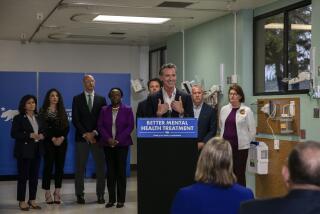Investing in Municipal Bonds Is Getting Riskier
- Share via
We all know that the economic slowdown and looming recession are adding to the risk of such investments as stocks, junk bonds and real estate. Another riskier investment to add to that list is tax-free municipal bonds.
While muni bonds are still considered far safer than stocks and many other investments, default rates on munis have been rising sharply, requiring you to exercise more care when investing.
If economic problems worsen, holders of riskier issues might see considerable declines in prices of their bonds, or defaults. While you seldom lose all your money in a default, you can suffer lower or delayed interest payments, or you won’t get all of your principal back.
The higher default risk stems from several factors.
Bonds issued to finance housing projects are suffering from the nationwide real estate slump. Those issued to finance hospitals and other health-care facilities are suffering because of rising costs and government-imposed limits on reimbursements from medical insurance.
Bonds issued to fund water and sewer plants, transportation and other infrastructure needs--normally considered among the safest--are getting riskier because states and municipalities are suffering fiscal squeezes. All told, budgets of state and local governments combined have gone from a surplus in the mid-1980s to the biggest aggregate deficit in over 30 years, says Joel M. Vernick, a vice president at David L. Babson & Co., a Cambridge, Mass., investment advisory firm.
The softening economy has depressed revenue growth from sales, personal and corporate taxes. Also, federal assistance has been sharply reduced, and federal mandates have forced increased state and local spending to comply with numerous requirements set by Congress, involving such things as Medicaid, water cleanup, worker safety and handicapped facilities, Vernick says. Taxpayer revolts have compounded the fiscal pressures by limiting tax increases.
The most recent evidence of this squeeze can be seen in Philadelphia, which is on the brink of insolvency after having difficulties raising money needed to cover current cash outlays. By December, the city may be unable to meet its payroll, according to analysts.
“What we’re seeing in Philadelphia could spread to other cities and municipalities,” Vernick says. “I’m not predicting a wave of defaults, but I am suggesting that investors go in with their eyes wide open.”
All told, municipal-bond defaults could total as much as $600 million for the first six months of this year, up sharply from $370 million for the same period a year ago, says Richard Lehmann, president of the Bond Investors Assn., a Miami Lakes, Fla., investor group. Most of these defaults are in housing and hospital bonds, he notes.
The problem is not just confined to higher default risk. Another potential problem is that the difference in yield between higher- and lower-rated bonds has narrowed--meaning that investors are not adequately rewarded by getting a higher yield on riskier issues, Vernick says.
Why has this “yield spread” narrowed? In part because individual investors have become the dominant buyers of munis, either directly or through mutual funds. And as it turns out, individuals are more inclined to invest for higher yields despite the added risks--thus driving down yields of the riskier issues.
“Many individuals typically reach for yield and don’t do more analysis beyond the surface,” Vernick says.
Individuals have become the dominant municipal bond investors largely because these bonds are one of the few legitimate tax shelters left after the Tax Reform Act of 1986. That has spurred greater demand from individuals, while the biggest institutional investors--banks and insurance companies--have reduced their demand because of tax law changes and other factors.
With these added risks, what should you do?
Only buy individual issues if you know what you’re doing, can carefully assess the risks and have at least $50,000 to $100,000 to invest. That will ensure that you can buy enough issues to get adequate diversification and can buy in large enough quantities so that you’re not eaten up by high brokerage commissions.
If you are a conservative investor and can’t afford any losses, stick only to bonds that are rated AA or higher. Consider insured bonds, although be aware that bond insurance is not an iron-clad guarantee against loss. Lehmann of the Bond Investors Assn. suggests avoiding housing and health-care bonds unless they are insured. Invest in these and other lower-grade credits only if you know what you’re doing and understand the risks, Vernick says.
If you don’t have big bucks to invest, stick to mutual funds. They will give you diversification, so that you won’t lose your shirt if a few bonds default. They also will give you better liquidity--the ability to sell quickly. And you will be relying on professional money managers to sort out the best values.
More to Read
Inside the business of entertainment
The Wide Shot brings you news, analysis and insights on everything from streaming wars to production — and what it all means for the future.
You may occasionally receive promotional content from the Los Angeles Times.










